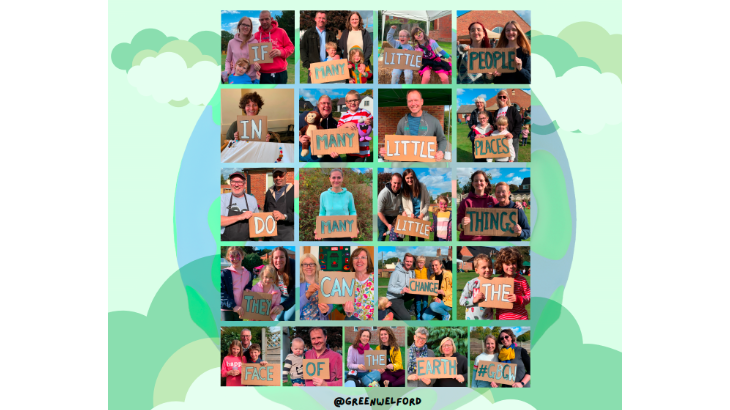popcawn - People Power - February 2024

Do you ever feel powerless or overwhelmed when you hear about the latest extreme weather event or species on the verge of extinction?
You’re not alone. One of my personal lowest points was when I comforted my 10 year old son, upset while watching a lone seal pup drift away on a remnant of an iceberg as David Attenborough commented on how faster-disintegrating sea ice means fewer and fewer seal pups survive. I struggled for words.
He knows that the planet is warming and that animals and humans are dying because of it. He also hears me talking about how little is being done about it. So I couldn’t tell him the white lie that everything will be ok. I was honest and shared that I’m worried about it too and so are millions of other people. We talked about David Attenborough being worried about it, Greta Thunberg being worried about it, and all the scientists, campaigners and authors who are worried about it.
We came to realise that we found comfort knowing that so many other people care too. I noticed a similar effect on my levels of hope when I attended the CA-WN get-together at Northampton Museum last month. I came away feeling energised and optimistic – which is unusual for an introvert after a social gathering! If you were able to attend too, please do let us know how you felt about it either in the comments below or via email.
Strength in numbers not only manifests as mutual hope, but also has a tangible effect on climate action. Our planet is warming because we collectively (certainly in developed countries) are causing CO2 to be emitted throughout our day, albeit some vastly more than others. It follows, therefore, that if we each reduced our carbon emissions, it would translate into a collective reduction that could make a sizeable impact on our emissions reduction target. Indeed a 2022 report for the House of Lords suggested that almost one third of the required emissions cuts in the UK by 2035 need to come from individual actions1.
So the more people who understand and care about the climate and biodiversity crises, the more that will be done about it. However, this effect is not only linear and proportional. Social tipping points also have an important role. These have been defined as points at which potentially irreversible change in society is driven by positive-feedback mechanisms2. As I understand it, such tipping points haven’t routinely been included in climate models3, meaning the ensuing acceleration in behaviour that protects the environment hasn’t completely been accounted for. I hold hope that protective behaviours will become social norms – it makes us humans very uncomfortable to go against the social norm, so just imagine what the positive impact could be!
Of course, the majority of CO2 and other greenhouse gas emissions cuts, plus protection of nature, need to come from governments and businesses, but people are not powerless to influence this area. Especially in an election year, individuals have a huge opportunity to influence government policy on climate and biodiversity targets. Political parties are on the hunt for votes, based on what matters most to the electorate. So let your current MP know what matters to you, and get these issues in the manifestoes. When it comes to businesses, you can vote with your pound by spending money with companies that operate sustainably or are at least local and independent, rather than faceless international corporations that have margins to squeeze and can afford to greenwash and pay pollution fines rather than clean up their act.
At the end of our conversation, my son asked me what he could do to help. I told him to talk to his friends about it, so that more and more people care about it, and the ripples spread…strength in numbers.
I'll leave you with a quote from Green Welford, who are working hard to get the community together in climate action, and who supplied the lovely photo at the top of the page:
Here at Green Welford our aim is to champion the sustainable future of our community and we believe that an effective way to do this is through organising community events. Tackling anything on your own can seem like a scary and overwhelming task - especially when it is something as big as climate change. By coming together as a group you are sharing the enormity of it all, exchanging ideas, learning from others and, most importantly, realising that we are all in this together; by working together it is far more effective (and far more fun!) than trying to do it all on your own.
Since we formed in September 2021 we have held coffee mornings, clothes swaps, film screenings, talks, litter picks and our biggest and most successful event to date has been KidsFest - a day of eco events for children which is absolutely free to attend. This year it will be held on June 8th.
Follow Green Welford on Instagram @greenwelford and Facebook @GreenWelford
Hannah and Ellen from Green Welford gave an excellent talk on Carbon Literacy to CA-WN's January 2024 public meeting. You can find notes and links to their slides and a recording of the talk here .
References:
- House of Lords Environment and Climate Change Committee. In our hands: behaviour change for climate and environmental goals. Available at: https://publications.parliament.uk/pa/ld5803/ldselect/ldenvcl/64/64.pdf. Accessed 3 February 2024
- Otto IM, et al. Social tipping dynamics for stabilizing Earth’s climate by 2050. PNAS 117, 2354–2365 (2020). Available at: https://www.pnas.org/doi/full/10.1073/pnas.1900577117. Accessed 3 February 2024
- Moore FC, et al. Determinants of emissions pathways in the coupled climate–social system. Nature 603, 103–111 (2022). Available at: https://www.nature.com/articles/s41586-022-04423-8. Accessed 3 February 2024
